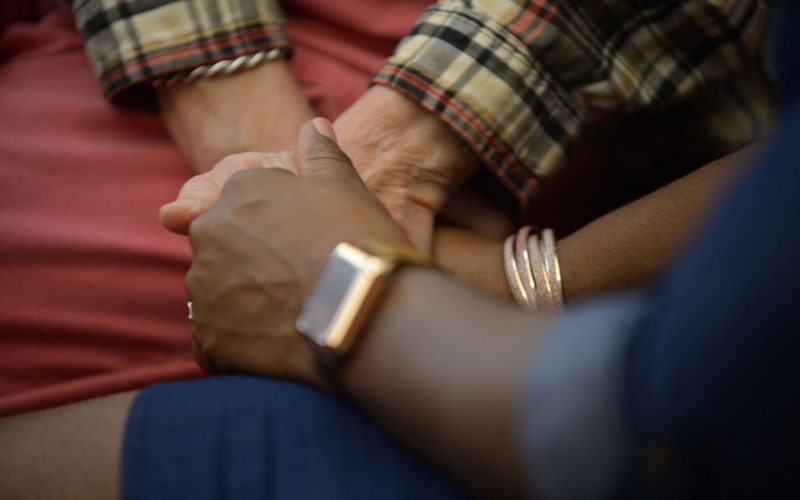Two halves meet to consider the whole

The Free Weekly/ANDY SHUPE
Raven Cook, educator and founder of Foundations: Black History Educational Programming, speaks Saturday during the Sto(m)p Racism workshop at the Fayetteville Unitarian Universalist Fellowship. The event was sponsored by Omni Center, Compassion Fayetteville, Unitarian Universalist Fellowship and Industrial Workers of the World as a way to explore racism and what white residents must do to contribute to ending racism.
Northwest Arkansas residents sipped coffee and chatted among themselves as the Unitarian Universalist Fellowship filled up for the Sto(m)p Racism workshop Saturday morning. Anticipation about the day’s topic could be heard and felt throughout the space.
The topic: What do African Americans want from white allies?
Speakers Raven Cook and Dorothy Marcy both said they can’t speak for all black people.
“There are no two people exactly alike,” Marcy said. “If you got all the black folk together, even just the black folk in Fayetteville, we would probably never be able to come to a consensus about what we want from you. So, I will not tell you what all black people want, because I don’t know. What I will try to do is to tell you what we don’t want. But this is just my perspective.”
Cook is the director of Foundations: Black History Educational Programming, an educator with Crystal Bridges Museum of American Art in Bentonville and grew up in North Little Rock. She’s the reason many in the audience said they came Saturday, calling themselves Raven groupies. She spoke about being committed and the importance of history and how it shapes the concept of Americanness.
“As an ally in the fight for humanity, it’s important to remain committed — committed to love for all people and committed to understanding to produce positive change,” Cook said. “Today, I challenge you to consider what gift you have in yourself that may be useful for not just the advancement of black Americans but humanity.”
Cook hit on topics such as criminalizing blackness and incarceration, cultural appropriation and black activism and patriotism, weaving in historical and modern examples, quotes from famous black intellectuals and her own humor and insight.
“History is a catalyst for change, but black history is not taught in school. It is not integrated into the American cultural history, and it is unfortunate,” she said. “The Confederate monuments and flags that are around our cities and are elegantly tied to stories of Americanness, even in its treason, are more integrated into the American historical record than black American history.”
Cook advised the audience it’s small things every day — such as joining a vigil and writing a letter to a local paper — that become part of a larger flow of choices. When enough people do enough small actions, change takes place, she said, “and that is to be committed.”
Marcy is a counselor who grew up in Fort Smith during the Jim Crow area. She took a more interactive approach to the topic.
She spent about 30 minutes allowing each person present, most of whom were white, to introduce themselves, say something they liked about themselves and why they were there. Many talked about their open-mindedness and desire to learn and said they think racism is getting worse.
Ines Polonius works in the Arkansas Delta with Communities Unlimited, which offers infrastructure services and economic entrepreneurial growth strategies.

Free Weekly/ANDY SHUPE
Patty Besom of Fayetteville and Monique Jones, Northwest Arkansas Branch president of the NAACP, hold hands Saturday as they speak during the Sto(m)p Racism workshop at the Fayetteville Unitarian Universalist Fellowship.
“With that work comes a lot of work around my own racism, and it is an onion. Every chance I get to learn more, I’m peeling back another layer of that onion,” she said about why she attended the workshop.
Northwest Arkansas is in a unique place to lead the state by example, Polonius said.
Monique Jones, Northwest Arkansas Branch president of the NAACP, also attended Saturday’s workshop.
“I wanted to be here to hear everyone’s input, to give input, to be open to suggestions that will help us in our organization to be inclusive in this community,” Jones said.
Marcy spoke about the struggle and the bravery it takes to reach across the racial divide.
“We live in a time in our culture when we have to pull back the veil of politeness and correctness and look at the truth,” she said. “There is reason we don’t speak up to you about things like this. It takes courage … Every black parent, even today, has that moment where they sit down with their children and explain their relationship with white people: How to stay alive in the world. It still feels threatening to have a voice.”
An attitude of condescension, a missionary-like stance, toward African Americans is deeply woven into white culture, she said, and affects the psyche of everyone, black and white.
“Racism and white supremacy were sprinkled on your cornflakes every morning. You still carry it,” Marcy said.
FAQ
Inspire 365:
A Journey Through the Black Experience
WHEN — 7 p.m. Tuesdays through the end of November
WHERE — Omni Center for Peace, Justice and Ecology, 3274 N. Lee Ave. in Fayetteville
COST — Free
INFO — 935-4422



